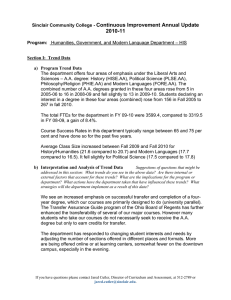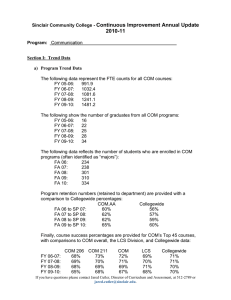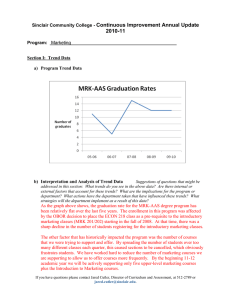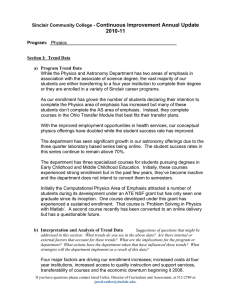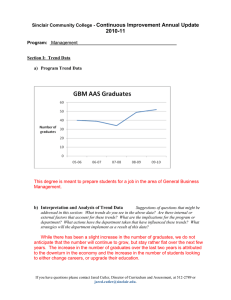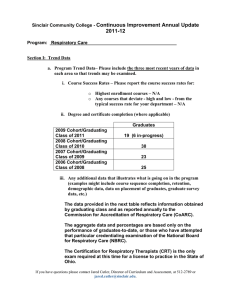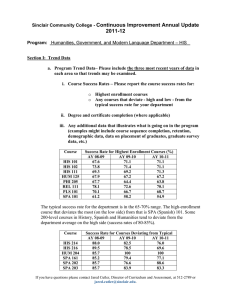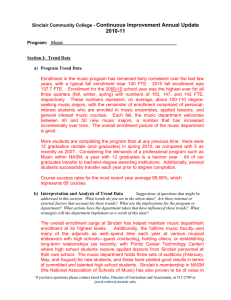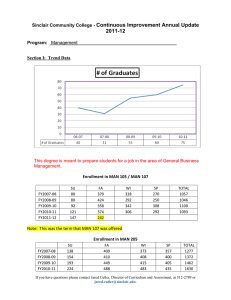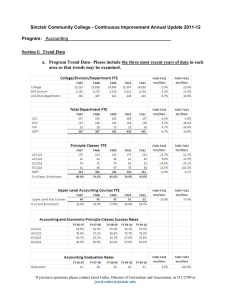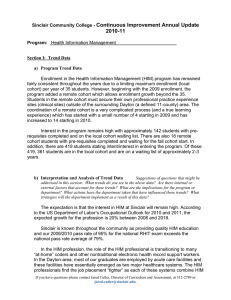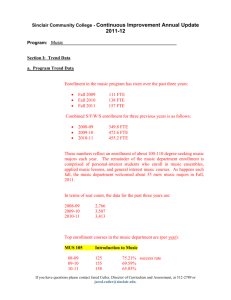07/FA 08/FA 09/FA 10/FA
advertisement
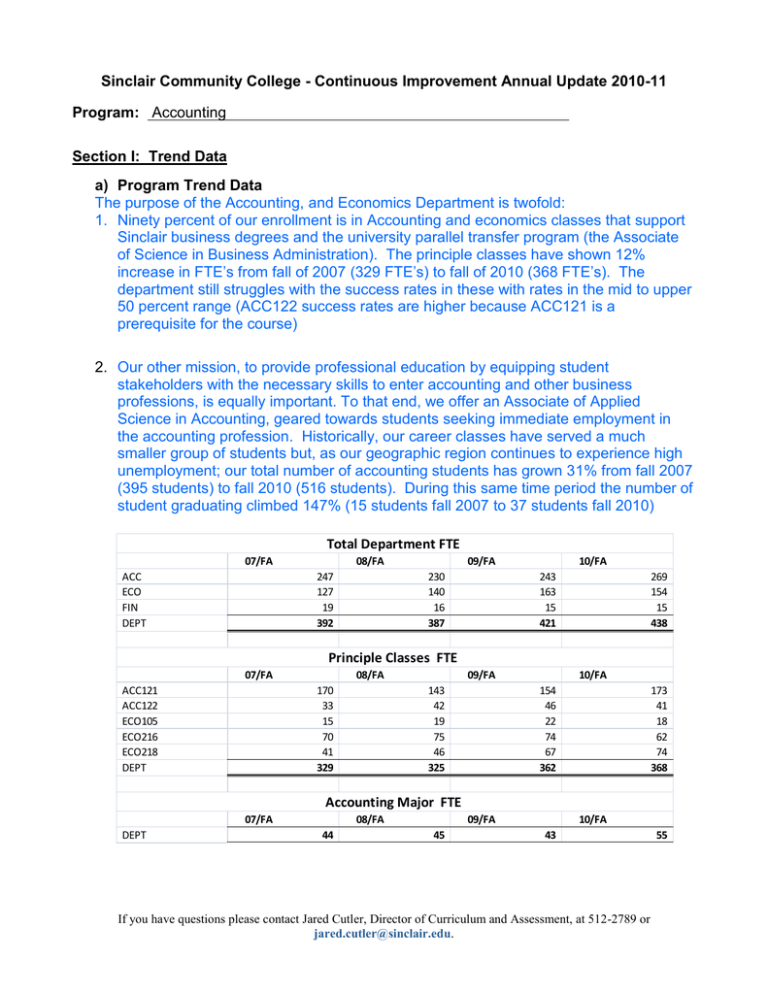
Sinclair Community College - Continuous Improvement Annual Update 2010-11 Program: Accounting Section I: Trend Data a) Program Trend Data The purpose of the Accounting, and Economics Department is twofold: 1. Ninety percent of our enrollment is in Accounting and economics classes that support Sinclair business degrees and the university parallel transfer program (the Associate of Science in Business Administration). The principle classes have shown 12% increase in FTE’s from fall of 2007 (329 FTE’s) to fall of 2010 (368 FTE’s). The department still struggles with the success rates in these with rates in the mid to upper 50 percent range (ACC122 success rates are higher because ACC121 is a prerequisite for the course) 2. Our other mission, to provide professional education by equipping student stakeholders with the necessary skills to enter accounting and other business professions, is equally important. To that end, we offer an Associate of Applied Science in Accounting, geared towards students seeking immediate employment in the accounting profession. Historically, our career classes have served a much smaller group of students but, as our geographic region continues to experience high unemployment; our total number of accounting students has grown 31% from fall 2007 (395 students) to fall 2010 (516 students). During this same time period the number of student graduating climbed 147% (15 students fall 2007 to 37 students fall 2010) Total Department FTE 07/FA ACC ECO FIN DEPT 08/FA 247 127 19 392 09/FA 230 140 16 387 10/FA 243 163 15 421 269 154 15 438 Principle Classes FTE 07/FA ACC121 ACC122 ECO105 ECO216 ECO218 DEPT 08/FA 170 33 15 70 41 329 09/FA 143 42 19 75 46 325 10/FA 154 46 22 74 67 362 173 41 18 62 74 368 Accounting Major FTE 07/FA DEPT 08/FA 44 09/FA 45 10/FA 43 If you have questions please contact Jared Cutler, Director of Curriculum and Assessment, at 512-2789 or jared.cutler@sinclair.edu. 55 ACC and ECO Principle Classes Success Rates FY 06-07 ACC121 ACC122 ECO216 ECO218 FY 07-08 52.9% 78.8% 56.8% 64.5% FY 08-09 53.9% 71.7% 52.6% 63.1% FY 09-10 55.3% 68.8% 58.6% 63.8% 56.3% 75.8% 58.0% 57.9% Accounting Enrollment and Graduation Rates Fall 2007 Enrollment Graduation Fall 2008 395 15 Fall 2009 502 30 Fall 2010 496 29 516 37 b) Interpretation and Analysis of Trend Data Suggestions of questions that might be addressed in this section: What trends do you see in the above data? Are there internal or external factors that account for these trends? What are the implications for the program or department? What actions have the department taken that have influenced these trends? What strategies will the department implement as a result of this data? The department believes the increased enrollment trends for the principles of accounting and economics will continue as the state of Ohio has places more emphasis on college graduates and transfers from community college to four year universities. Recognizing these trends will continue and that success rates have stayed consistently low, the department has taken the following actions during the year: Standardization of teaching syllabi to enable consistent collection of assessment data within the course delivery system (Angel). Economics’ faculty have been class testing two online homework / student resource software throughout the academic year. Initial data suggest that students using the online products have higher success in economics principles classes than not using any online product. As for the students seeking an Associate of Applied Science in Accounting, the department feels that we are at the peak of the enrollment cycle. With the economy improving, more people are working, and fewer resources available for the unemployed we anticipate fewer accounting majors. This should be offset by increased interest in the accounting tax certificate as the federal government requires all tax preparers to register and pass an exam given by the IRS. We are realigning the tax certificate to fill this need as we transition into semesters. If you have questions please contact Jared Cutler, Director of Curriculum and Assessment, at 512-2789 or jared.cutler@sinclair.edu. Section II: Progress Since the Most Recent Review a) What was the fiscal year of the most recent Program Review for this program? 2009 b) Briefly summarize the goals that were listed in Section IV part E of the most recent Program Review Self-Study (this section of the Self-Study asks “What are the department’s/program’s goals and rationale for expanding and improving student learning, including new courses, programs, delivery formats and locations”)? The self study basically addressed two issues: 1. Retention and success factors of accounting and economic principle classes 2. Addressing incorporation of International Financial Accounting Standards (IFRS) into the upper level courses c) Have these goals changed since your last Program Review Self-Study? If so, please describe the changes. No d) What progress has been made toward meeting any of the goals listed above in the past year? Much of what we have done to address retention and success factors in the accounting and principles classes were addressed in part b of the analysis of trend data of this report. To address changes do to IFRS, the annual 40 hours of continuing education required to maintain faculty CPA credentials has helped prepare the department as the US transitions into international standards. e) What Recommendations for Action were made by the review team to the most recent Program Review? What progress has been made towards meeting these recommendations in the past year? Recommendations for Action • It is important that the department develop a more complete understanding of why students are not completing the associate degree and explore strategies to improve acceptance of Sinclair courses by four year institutions The department has not formally studied the reasons for students not completing associates degree in accounting but graduation rates have increased 147% since 2007. • Investigate the need for developing a certificate program for those students who only want to enroll in particular courses and are not seeking an associate degree. The accounting department has revamped its tax certificate to attract a new market. The revised tax certificate rollout coincides with the federal governments requirement for all tax prepares to be licensed by 2013. If you have questions please contact Jared Cutler, Director of Curriculum and Assessment, at 512-2789 or jared.cutler@sinclair.edu. • • • • Secure additional high quality internship and coop opportunities for students. In progress, no significant action taken. Develop means to document direct measures of general education outcomes and program outcomes, and demonstrate how data are being used to improve learning outcomes. In progress, no significant action taken. Assess fully the sections taught by adjunct faculty in light of utilization of adjuncts vs. need for additional tenure track faculty, e.g. faculty with auditing experience. Ensure that supporting materials and guidance for adjuncts are well-targeted to the learning outcomes and level of proficiency required by the program. All adjuncts are using a common course syllabi, course shells, course exams, course quizzes and course assignments. The department’s goal was to also create a common course collection of assessment data using Sinclair’s course delivery system, Angel. The department has struggled using Angel as a means of assessment collection and continues to work in this area. Use documentation of utilization of services designed to assist students to support the need for an accounting lab. During fall 2010 and winter 2011 data was collected to support the need of additional resources for an accounting / economics lab. Section III: Assessment of Outcomes The Program Outcomes for this program are listed below. At least one-third of your program outcomes must be assessed as part of this Annual Update, and across the next three years all of these program outcomes must be assessed at least once. Accounting Program Outcomes 1) Mathematical Skills Apply mathematical skills to formulas and solve problems.. 2) Accounting Skills Apply the principles of financial, managerial, cost and tax accounting. 3) General Business Knowledge Describe and apply general business knowledge skills and computer skills.. 4) Human creativity Apply principles of human creativity and its relation to society. In which courses are these program outcomes addressed? MAT116, 122, ACC125 ACC201, 202, 203, 211, 212, 221, 222, 235 MAN105, 255 LAW101, 102 FIN215, MRK201 ECO216, 218 ACC121, 122, 240 Arts and Humanities Elective Which of these program outcomes were assessed during the last fiscal year? Assessment Methods Used Simulations Locally developed exams Simulations ACC125, 240 BIS160, COM211 ENG111, 112, ACC202, 212, 235, 6) Analytical Problem Solving Methods Use analytical problem-solving skills.. 222, 125 If you have questions please contact Jared Cutler, Director of Curriculum and Assessment, at 512-2789 or jared.cutler@sinclair.edu. 5) Effective Communication Demonstrate effective verbal and written communication. a) For the assessment methods listed in the table above, what were the results? What changes are planned as a result of the data? How will you determine whether those changes had an impact? Mathematical Skills were assessed using a simulation (lab exercise) in ACC125 class. The lab requires the development of formulas to calculate pay, and tax deductions for a small business. Labs were submitted and evaluated by faculty as to the accuracy of these calculations using a grading rubric. Eighty-five percent of the class successfully completed the sections of the lab that required formula formulation and correct calculation of pay and tax amounts. Although changes are constantly made to improve teaching strategies and learning outcomes, no changes are planned as a result of the data General Business Knowledge was assessed using simulations (homework assignments) in accounting ACC121WEB classes. Every business major as well as every accounting major is required to take ACC121 as part of their program. During spring of 2010 analysis of homework assignments revealed that homework was not being completed in WEB classes prior to submission deadlines. The faculty believed and a survey confirmed in the fall of 2010 that students were trying to complete the 3 to 5 hours of homework shortly before required submittal time. Starting winter quarter 2011, homework assignments were split in two and required students to submit midweek and at the end of the week. Data for winter and spring 2011 will be analyzed to determine: a. If requiring homework submittals twice a week versus once a week increases homework scores. b. If requiring homework submittals twice a week versus once a week increases exam scores and overall retention (success) in ACC121 WEB classes. b) What other changes have been made in past years as a result of assessment of program outcomes? What evidence is there that these changes have had an impact? During academic year 2008-2009 the accounting department implemented optional review sessions for ACC121 students. The review sessions are staffed by faculty and meet four times during the quarter. Between eight and ten percent of the WEB students have taken advantage of the review sessions since its implementation. Using the 2007-2008 academic year as a baseline, success rates are 2% higher for web students in the current academic year. c) Describe general education changes/improvements in your program/department during this past academic year (09-10). All accounting courses have one or more general education outcome incorporated into their courses; at this time no documented changes have been recorded. If you have questions please contact Jared Cutler, Director of Curriculum and Assessment, at 512-2789 or jared.cutler@sinclair.edu. Section IV: Improvement Efforts for the Fiscal Year a) FY 09-10: What other improvement efforts did the department make in FY 09-10? How successful were these efforts? What further efforts need to be made? If your department didn’t make improvement efforts during the fiscal year, discuss the strengths and weaknesses of the department over the last year and how the department plans to address them in the coming year. ACC121 Section Study for at Risk Classes Background: Retention in Principles of Financial Accounting (ACC 121) has been a concern of the department because of low retention. The course is a “Top 45” with retention rates of approximately 50%. During winter quarter the follow study was started for at risk ACC121 classes delivered in the classroom. o Through the help of RAR the top two sections of at-risk Accounting students. Sections 121-03 MWF @ 10 a.m. (John Wilson, faculty) and 121-08 TR @ 11 a.m. (Ken Kimble, faculty). o Beginning of winter quarter we contacted Angie Long from Tutorial Services. Along with an accounting tutor the identified classes were visited explaining to students two resources available to them: Open accounting labs Tutoring Services o We recruited upper level accounting students as tutors to support additional tutoring request and to staff open accounting labs for additional hours. o A follow-up email from the chair was sent through course section email reminding students of the open labs and tutoring. A link was provided to the tutorial Services web page with additional information about support. o A brief survey of students to identify what students have found helpful in learning Accounting. He will ask this question of the ACC 121 learners but also of the ACC 122 students since they have already completed 121 with success. Data: At Risk Classes Other Traditional Classes Pass Fail Total Predicted 13 26 39 Actual 16 23 39 Predicted % 33% 67% 100% Actual % 41% 59% 100% Pass Fail Total 46 34 80 40 40 80 58% 43% 100% 50% 50% 100% Results: o The study was small but there appears to be a significant improvement in success when students offered additional support outside the classroom. o The At Risk Group exceeded projections by 8% where the control group (Other Traditional Classes) was below projections by 8%. Notes: If you have questions please contact Jared Cutler, Director of Curriculum and Assessment, at 512-2789 or jared.cutler@sinclair.edu. o Six classes were visited spring quarter with Tutorial Services o An additional open lab was implemented to give students additional times for help b) FY 10-11: What improvement efforts does the department have planned for FY 10-11? How will you know whether you have been successful? The department is currently studying the impact of class attendance and homework completion for traditional financial accounting classes (ACC121). We currently have two quarters of attendance and homework data and are in the process of quantifying the impact to student success. Preliminary data suggest there is a strong correlation. The outcome of this might be to offer more student services to help students get to class or additional help to complete homework assignments along with adjusting curriculum for better pedagogy Questions regarding completion of the Annual Update? Please contact the Director of Curriculum and Assessment at 512-2789 to schedule a time to review the template and ask any questions. If you have questions please contact Jared Cutler, Director of Curriculum and Assessment, at 512-2789 or jared.cutler@sinclair.edu.
